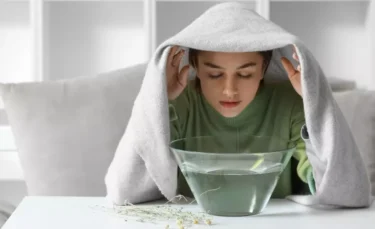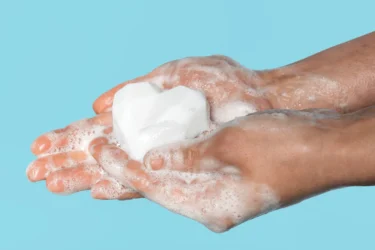Home Remedies For Tonsillitis
By Dr Anuja Bodhare +2 more

Get,

to manage your symptom
Get your,


4 Cr+ families
benefitted

OTP sent to 9988776655



You’ve successfully subscribed to receive
doctor-approved tips on
Whatsapp

Get ready to feel your best.

Hi There,
Download the PharmEasy App now!!


Register to Avail the Offer
Send OTPBy continuing, you agree with our Privacy Policy and Terms and Conditions

Hi There,
Sign up on PharmEasy now!!
Trusted by 4 crore+ families

OTP sent to 9988776655



You have unlocked 25% off on medicines




Code: NU25
By Dr Anuja Bodhare +2 more
Table of Contents
Tonsils are lumps of tissues present at the back of the throat. There are two of them present on each side of the throat. Tonsils are part of the immune system and are responsible for making antibodies and white blood cells to attack the germs inside the mouth. Tonsilitis is a condition characterised by inflammation (swelling) of the tonsils due to infection from either bacteria or viruses. It can occur in individuals of all age groups1. It is most common in children above two years of age. Adults can also get tonsilitis, but it is not very common.
Tonsillitis is not contagious, but the viruses or bacteria that cause it can be. Washing hands frequently can help prevent the spread of infection2.

Did you know?
Tonsilitis is caused due to bacterial or viral infection. The two types of tonsilitis are
Commonly presented as a sore throat, difficulty swallowing and painful lymph nodes, tonsillitis may subside on its own within a week or so after the symptoms arise with lots of fluids and rest. If not, it might require some intervention.
Dr Ashish Bajaj, M.B.B.S, M.D. in Clinical Pharmacology and Toxicology
People may experience slightly different symptoms of tonsilitis, but the most common symptoms of tonsilitis include:
Peritonsillar abscess (collection of pus around the tonsils) is a complication of tonsillitis and can present the following symptoms
The symptoms of tonsilitis may be similar to other health problems; consult your doctor for a diagnosis4.
Here are some home remedies for alleviating the symptoms:

Sipping on warm drinks like tea and chicken soups can soothe the back of your throat. You can also try cold liquids like ice water or popsicles. The choice is subjective to what works best for your throat. You can try both warm and cold liquids and see what suits you the best5.

You can mix salt or baking soda in a glass of warm water. Gargle with this liquid as and when required. Avoid swallowing it. Salt is beneficial in reducing the swelling and irritation in the throat. Baking soda soothes the throat5.

Antihistamine (antiallergic) drugs can help reduce or relieve throat pain and prevent the worsening of sore throat. In addition, pain medications like ibuprofen and acetaminophen can help manage the pain5.

Inhaling steam can help clear the throat. Steam can also moisturize and soothe a sore throat. You can start by taking a hot shower, and when it gets steamy, you can breathe in the steam5.
Take sufficient rest by elevating the bed or sitting straight in a chair to alleviate the pain and discomfort. Avoid lying down flat as it can cause swelling due to increased pressure at the back of your neck5.

Honey has natural antibacterial properties, due to which it acts as a wound-healing agent. In addition, it offers pain relief and reduces swelling. Honey can also help fight off viral infections6.

You can mix lemon juice with a glass of warm water and drink this liquid for pain relief. Lemon juice can help break the mucus and provide pain relief. In addition, lemon juice contains vitamin C, which can boost the immune system and help the body in fighting off infection6.

There are different types of teas that can provide relief from a sore throat. Clove tea and green tea have antibacterial and anti-inflammatory benefits that help in fighting infections and provide relief. Raspberry, peppermint, and chamomile teas are great options for reducing inflammation (swelling) and pain. Peppermint tea can alleviate pain6.
Honey, thyme or lemon are often used by patients and are considered to be effective for tonsilitis. These remedies have very few side effects and we therefore propose to include them in the range of treatments that can be proposed as treatment for tonsillitis.
Dr. M.G. Kartheeka, MBBS, MD(Pediatrics)

Apple cider vinegar has some antibacterial properties, but it is not beneficial for sore throat and throat infections.

Please avoid using any essential oils to alleviate your symptoms as there is a lack of data to prove their efficacy and safety5.


Though there are studies that show the benefits of the given herbs and home remedies in this condition, these are insufficient and there is a need for further studies to establish the true extent of the benefits of these herbs and home remedies on human health. Thus, these should be only taken under the guidance and supervision of your Ayurvedic physician.
You must not rely on home remedies for the treatment of this condition you should consult a qualified doctor for any advice for the condition.
Also Read: Doctor Approved Home Remedies For Vertigo
Inflammation of the tonsils (tonsillitis) can occur at any age throughout the lifetime but is less common in adults. Tonsillitis is the result of either a bacterial or viral infection, depending on which the treatment is initiated. Children are more likely to get tonsillitis and should receive timely help to relieve the symptoms. Many home remedies such as consuming honey with warm water, lemon with warm water and herbal teas provide relief from the symptoms of sore throat and tonsillitis and also help fight off the infection. But if your tonsillitis is painful and intervening with your daily activities, seek medical help.
Also Read: Home Remedies For Vomiting
Tonsillitis is most common in children out of all age groups. But it rarely occurs in children below the age of three3.
Tonsillitis does not cause any lasting or severe health problems. But there can be other complications like difficulty in breathing and abscess in the area of the tonsils3.
Most cases of viral tonsillitis can get cured on their own with fluids and rest. However, antibiotics are required to treat bacterial tonsillitis (strep throat)3. If your tonsillitis is not improving and causing problems, seek medical help.
Tonsillitis is not contagious, but the bacteria and viruses that cause it are highly contagious. Wash your hands frequently to prevent the spread of infection2.
Bacterial tonsillitis is also called strep throat. It is characterised by swelling of the tonsils due to a bacteria called Streptococcus3. You need to consult a doctor for the right diagnosis.
Viral tonsillitis may get cured on its own with plenty of rest and fluid intake, but strep throat or bacterial tonsillitis requires antibiotics for treatment. Consult with a doctor to get a proper diagnosis and treatment3.
Disclaimer: The information provided here is for educational/awareness purposes only and is not intended to be a substitute for medical treatment by a healthcare professional and should not be relied upon to diagnose or treat any medical condition. The reader should consult a registered medical practitioner to determine the appropriateness of the information and before consuming any medication. PharmEasy does not provide any guarantee or warranty (express or implied) regarding the accuracy, adequacy, completeness, legality, reliability or usefulness of the information; and disclaims any liability arising thereof.
Links and product recommendations in the information provided here are advertisements of third-party products available on the website. PharmEasy does not make any representation on the accuracy or suitability of such products/services. Advertisements do not influence the editorial decisions or content. The information in this blog is subject to change without notice. The authors and administrators reserve the right to modify, add, or remove content without notification. It is your responsibility to review this disclaimer regularly for any changes.
Comments

Leave your comment...
You may also like
Comments